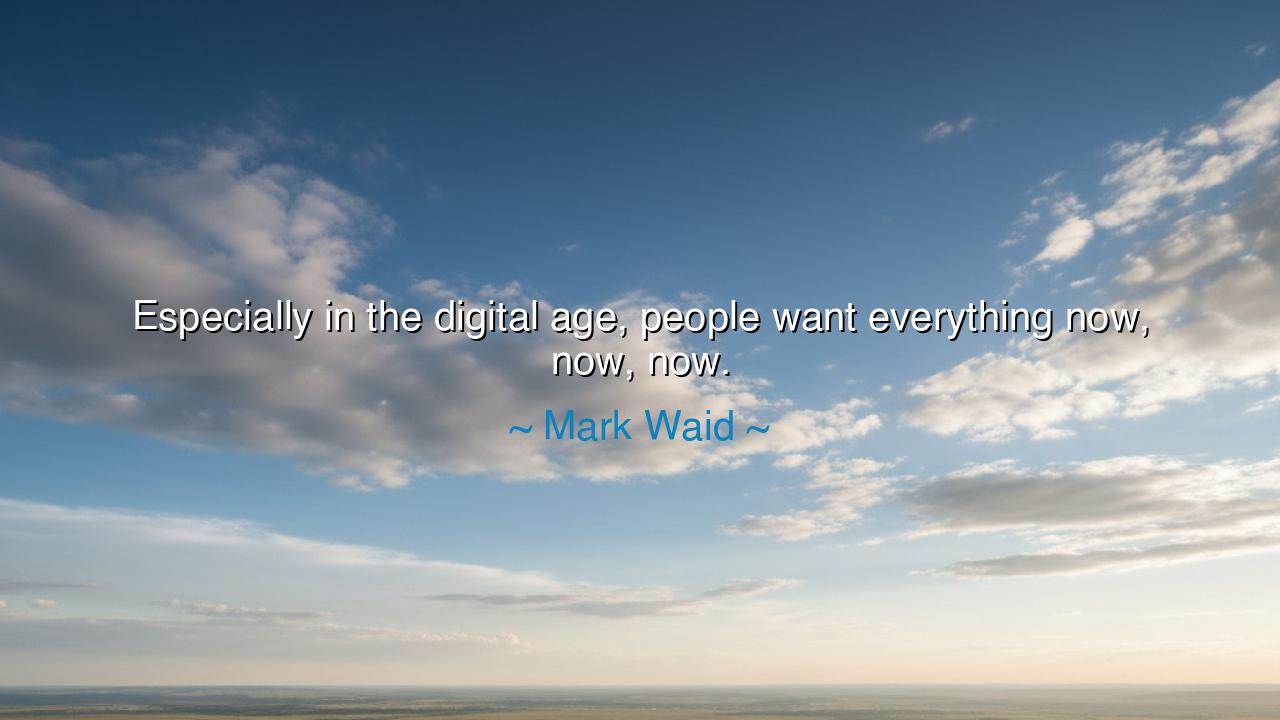
Especially in the digital age, people want everything now, now






The words of Mark Waid—“Especially in the digital age, people want everything now, now, now.”—resound like a bell tolling in the heart of our time. They speak to a truth that both defines and diminishes the spirit of the modern world: the impatience of immediacy. In these words lies not condemnation, but observation—a mirror held up to a generation that has forgotten the rhythm of patience, the art of waiting, and the sacred weight of time. Waid, a writer and storyteller, offers not only a critique of technology but a reflection on the human condition that has become entangled with its own creations.
To understand his words, we must first see how the digital age has transformed desire itself. In the age of the ancients, every harvest required a season; every masterpiece demanded years of devotion; every wisdom was born through silence, reflection, and endurance. But now, in this age of glowing screens and endless scrolls, we are surrounded by the illusion that anything can be ours instantly—knowledge, pleasure, recognition, and success. The human soul, once attuned to cycles and patience, now beats to the pulse of the machine, crying out: now, now, now! Waid’s observation is not only about our hunger for information—it is about our hunger for instant fulfillment, a hunger that devours the very satisfaction it seeks.
Yet this is not the first age to fall prey to its own inventions. History repeats this lesson, though in different forms. Consider the story of Prometheus, who in Greek myth stole fire from the gods and gave it to mankind. Fire was the first great technology—it brought light, warmth, and power. But it also brought impatience. With fire, humanity could no longer rest in darkness or wait for dawn; it could work through the night, consume faster, and demand more. The myth of Prometheus reminds us that every advance of power comes with a trial of discipline. So too does the digital fire of our own time—an eternal flame of information that burns at our fingertips, both illuminating and exhausting those who gaze too long into its light.
In Waid’s reflection, we also hear the lament of the artist. As a storyteller, he belongs to a tradition that has always revered process—the slow, deliberate unfolding of creativity. The artist, like the craftsman, understands that great works are born not of haste but of persistence. But in the world of “now, now, now,” even art is pressured to obey the clock of consumption. Stories are skimmed instead of savored; songs are streamed and forgotten; creators are measured not by mastery but by speed. The very act of creation, once an offering of patience to eternity, risks becoming a performance for the moment. In this, Waid’s words carry both warning and sorrow: that in our race toward instant gratification, we risk losing the depth that makes human experience meaningful.
Consider also the wisdom of Aesop’s fable of the tortoise and the hare. The hare, swift and confident, races ahead, believing his speed guarantees victory. The tortoise, slow and steady, perseveres without rush or restlessness. In the end, it is the tortoise who triumphs—not because he is fast, but because he is faithful. This ancient tale carries the same truth that Waid reminds us of: haste is the enemy of mastery, and those who seek everything instantly often grasp nothing deeply. The digital age may have made us faster, but it has not made us wiser. Wisdom still moves at the pace of reflection, and joy still blossoms only through time.
Yet Waid’s insight is not one of despair—it is an invitation to awareness. The tools of the digital age are not evil; they are powerful. But they demand from us the strength to use them with mindfulness. The one who learns to pause amid the noise, to wait amid the rush, becomes not enslaved but sovereign. The art of delayed gratification, long forgotten, must be remembered as a sacred skill. For those who can wait, life offers not mere stimulation, but revelation. The fruit that ripens slowly is always sweeter than that which is forced to grow overnight.
So, let this be the teaching drawn from Mark Waid’s words: do not mistake speed for progress, nor immediacy for fulfillment. Learn again the patience of the ancients—the patience of builders, thinkers, and dreamers who understood that greatness is not downloaded, but developed. In your work, your art, your relationships, and your spirit, let time be your ally, not your enemy. Disconnect long enough to listen, to breathe, to create with care. Seek depth over velocity, wisdom over convenience, and meaning over momentum.
For in the end, when the frenzy of “now, now, now” has faded into silence, what will remain are not the things acquired in haste, but the things built in patience. Mark Waid’s words remind us that the soul was never designed to move at the speed of the machine. To live fully is to reclaim the tempo of humanity—to rediscover the beauty of the long journey, the slow thought, the steady hand. For only in learning to wait do we truly learn to live.






AAdministratorAdministrator
Welcome, honored guests. Please leave a comment, we will respond soon